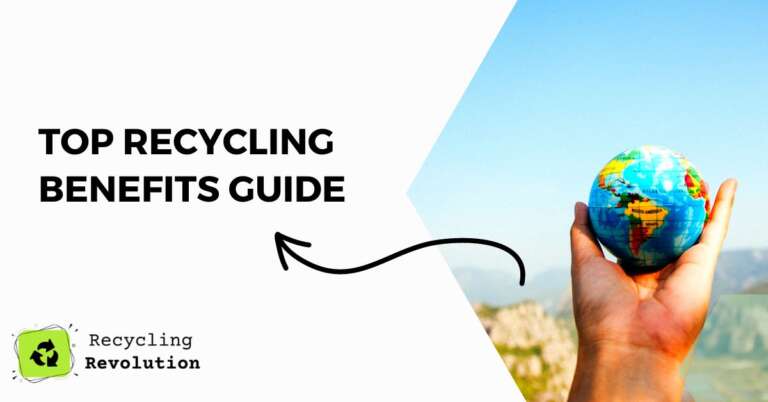Ah, recycling – that green icon on trash cans and bins that seems to be everywhere nowadays. But have you ever stopped to consider the profound impact this humble act has on our planet?
In this comprehensive guide, I’ll be delving deep into the numerous advantages recycling brings to our world. I promise, by the end of this article, you’ll view that empty soda can in a whole new light.
TL;DR: Recycling conserves our planet’s resources, reduces waste in landfills, and minimizes our carbon footprint. It’s a triple-win solution for a sustainable future.
Conservation of Natural Resources
One of the most immediate benefits of recycling is the conservation of natural resources. Every time we repurpose materials, we reduce the need to mine and harvest new resources.
Save the Trees!
Paper recycling alone has saved countless trees. Trees are essential for clean air, and they serve as carbon sinks, absorbing the excess CO2 that’s driving climate change. For every ton of paper recycled, we save 17 trees and 7,000 gallons of water.
Conserving Mineral Resources
Mining is not only energy-intensive but also detrimental to our environment. Recycling metals, like aluminum, reduces the need for mining, conserving resources and diminishing the associated environmental harm.
Reduction of Landfill Waste
Landfills are problematic for various reasons, from leaching toxic chemicals to occupying valuable land.
Longevity of Landfills
The more we recycle, the longer our existing landfills last. With limited space available, it’s essential that we make every square inch count.
Greenhouse Gas Reduction
As waste breaks down in landfills, it produces methane – a greenhouse gas 21 times more potent than carbon dioxide. By recycling, we limit the waste that goes into these sites, thus decreasing methane emissions.
Energy Savings
Recycling can be a more energy-efficient process than producing products from raw materials.
Recycled Aluminum Shines
I recommend looking at the stats for aluminum. Recycling aluminum saves a whopping 95% of the energy needed to produce the same amount of aluminum from its raw form, bauxite.
Glass and Energy Conservation
Similarly, recycling glass consumes 40% less energy than manufacturing it from sand, soda ash, and limestone.
Economic Growth and Job Creation
Green jobs are on the rise, and the recycling industry is a major player in this sector.
Booming Recycling Industry
Recycling and reuse establishments in the U.S. employ more than 1.1 million people, generate an annual payroll of nearly $37 billion, and gross over $236 billion in annual revenues.
Lowering Pollution
Last but certainly not least, recycling plays a crucial role in pollution reduction.
Cleaner Air, Happier Lungs
Manufacturing with recycled materials, with fewer toxins and pollutants, means cleaner air and fewer health problems for us. Studies have shown that areas with active recycling programs often have better air quality.
Note: While recycling is undeniably beneficial, it’s crucial that we practice it correctly. Contaminated recycling can be counterproductive. Always clean out recyclables and be aware of your local recycling guidelines.
The Circular Economy: Beyond Just Recycling
While most discussions on recycling focus on the act of turning used materials into new products, it’s essential to view recycling as part of a broader context: the circular economy.
This concept emphasizes keeping resources in use for as long as possible, extracting their maximum value, and then recovering and regenerating these materials at the end of each product life.
Extended Producer Responsibility (EPR)
EPR is a strategy that assigns manufacturers the responsibility for the end-of-life treatment of the products they produce. It’s a game-changer.
Instead of consumers bearing the sole responsibility for recycling, manufacturers now have an incentive to design products that are easier to recycle or even upcycle.
Upcycling: Recycling’s Trendy Cousin
Unlike recycling, which typically converts waste into a product of similar or lesser quality, upcycling involves transforming by-products, waste materials, or unwanted products into new materials or products of better quality or environmental value.
Think of it as giving your waste a promotion. Instead of an old t-shirt becoming a rag, it could be upcycled into a trendy bag or pillow cover.
Environmental Impact of Not Recycling
When we neglect recycling, the ramifications are extensive.
Water and Soil Contamination
Landfills, especially poorly managed ones, can leach harmful chemicals into our water systems. This affects aquatic life, the health of our ecosystems, and even our drinking water.
Similarly, toxins from untreated waste can degrade the soil, affecting agriculture and disrupting local flora and fauna.
Increased Carbon Emissions
Using raw materials in the manufacturing process often releases more carbon and other greenhouse gases into the atmosphere than using recycled materials would.
These emissions contribute to global warming and its associated effects, like rising sea levels and more frequent extreme weather events.
Societal Implications of Recycling
Recycling isn’t just an environmental endeavor; it’s a societal one.
Community Building
Recycling can be a communal effort, fostering a sense of community responsibility and pride. When neighborhoods come together for recycling drives or communal composting efforts, they’re not just preserving the environment – they’re strengthening community ties.
Educational Opportunities
Recycling provides an avenue for education. Schools and communities can use it as a practical way to teach children about sustainability, responsibility, and the science behind waste management.
The Future of Recycling: Innovations on the Horizon
Technology and innovation are playing a vital role in pushing the boundaries of what we can recycle and how efficiently we can do it.
Advanced Sorting Technologies
Innovations in sorting technologies mean that recycling plants can now separate materials with incredible accuracy, leading to less contamination and more efficient recycling processes.
Bioplastics and Compostable Materials
While traditional plastics are a recycling nightmare due to their longevity and the toxins they can release, bioplastics offer a more sustainable alternative. Made from renewable sources, they are often compostable, reducing the need for recycling or landfill disposal.
Chemical Recycling
While traditional recycling relies on physical processes, chemical recycling breaks down plastics to their molecular level, allowing for the removal of impurities and the creation of high-quality plastics.
Note: As we look towards the future, it’s not just about recycling better but also about rethinking our entire approach to waste. By focusing on reducing and reusing, as well as recycling, we can move closer to a truly sustainable world.
Conclusion
So, the next time you’re about to toss something in the trash, stop and think. That simple act of placing it in a recycling bin can have far-reaching effects, from conserving our planet’s valuable resources and energy to creating jobs and reducing pollution.
In essence, recycling is one of the easiest ways for you to make a positive impact. Your world – our world – will thank you for it.
FAQ
Is recycling truly energy efficient?
Yes, especially for materials like aluminum and glass, where substantial energy savings occur compared to using raw materials.
Does recycling really reduce pollution?
Absolutely. Recycling means fewer raw materials are processed and fewer toxins are released into our environment.
How can I ensure I’m recycling correctly?
Stay informed about your local recycling guidelines. Remember to clean out recyclables, as contamination can hinder the recycling process.
Remember, recycling is more than just a habit; it’s a commitment to a better, sustainable future. Let’s all play our part!

